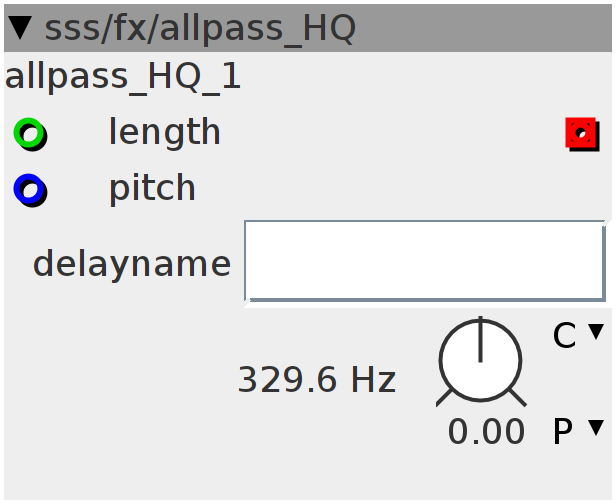allpass_HQ
HQ allpass effect. use the pitch parameter or input to set the delaytime. The longer the buffer, the less interpolation between buffer points. Set the recording delay to a high value (21.8s) to be able to morph from small to large modulation width. Then use an int-control to set the length of the phaser's counter (see delay's XML for the maximum "power" length sizes of the delay buffer).
Inlets
int32 Use int-control to set "power length" (see delay module for corresponding "power values"
frac32 pitch
Outlets
frac32buffer wave
Parameters
frac32.s.map.pitch pitch
Attributes
objref delayname
Declaration
int32_t phase1;
int64_t val;
int64_t ctrl0;
int64_t ctrl1;
int64_t ctrl2;
int64_t ctrl3;
int64_t ctrl4;
int64_t ctrl5;
int64_t ctrl6;
int64_t next1;
int64_t next2;
int64_t next3;
int64_t next4;
int64_t next5;
int64_t next6;
int64_t prev;
int64_t ccomp1;
int trg1;
int trg2;
int64_t dir;
int64_t val2;
int64_t out1;
int64_t out2;
int64_t sine1;
int64_t sine2;
int32_t freq;
Control Rate
int32_t fraq;
MTOF(0 - param_pitch - inlet_pitch, fraq);
Audio Rate
freq = freq + ((fraq - freq) >> 14);
ctrl3 = (freq >> 27 - (inlet_length - 1));
ctrl2 = (freq >> 27 - (inlet_length - 1)) + 1;
ctrl1 = (freq >> 27 - (inlet_length - 1)) + 2;
phase1 = (freq - (ctrl3 << (27 - (inlet_length - 1)))) << (inlet_length - 1);
ccomp1 = (1 << 27) - phase1;
SINE2TINTERP(((ctrl2 << (33 - inlet_length)) -
(phase1 >> (33 - inlet_length))) -
(1 << 30),
sine1)
sine1 = (sine1 >> 5) + (1 << 26);
sine2 = (1 << 27) - sine1;
uint32_t delay1 = attr_delayname.writepos - ctrl3 - BUFSIZE + buffer_index;
next1 = attr_delayname.array[delay1 & attr_delayname.LENGTHMASK] << 14;
uint32_t delay2 = attr_delayname.writepos - ctrl2 - BUFSIZE + buffer_index;
next2 = attr_delayname.array[delay2 & attr_delayname.LENGTHMASK] << 14;
uint32_t delay3 = attr_delayname.writepos - ctrl1 - BUFSIZE + buffer_index;
next3 = attr_delayname.array[delay3 & attr_delayname.LENGTHMASK] << 14;
out1 = (___SMMUL(ccomp1 << 3, next1 << 2) + next2 +
___SMMUL(phase1 << 3, next3 << 2)) >>
1;
val2 = val2 + (((out1) << 32) - val2) >> 1;
outlet_out = ((val2) >> 32);